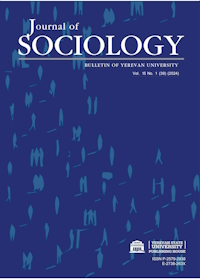DEVELOPMENT OF PARENTING SKILLS IN A SCOPE OF GROUP SOCIAL WORK
DOI:
https://doi.org/10.46991/BYSU:F/2024.15.1.043Keywords:
child development,, parenting skill, parenting styles, parent-child relationship, social group work, theory of attachmentAbstract
Parenting skills play a crucial role in shaping children's development and well-being. This aticle presents a comprehensive review of the literature and research on the development of parenting skills, focusing on various factors influencing parenting practices, interventions aimed at enhancing parenting skills. In order to study the native experience of developing parenting skills, the program of group work implemented in 2022-2023 in "Shogh" community-based children's day centers operating under the Armenian Missionary Association of America (AMAA) was presented. The mission of the researched project was to form a conscious and positive approach to parenting in Armenia, and the goal was to develop the parenting knowledge and skills of parents of school-age children. For its evaluation, 2 main methods were used: "Before and after" evaluation and "The most significant change" survey, after which a quantitative and qualitative analysis of the obtained results was performed. The authors argue that a review of both theoretical and research literature indicate that the development of parenting skills has a direct impact on the child's socio-psychological development, on the dynamics of family relationships and, in general, on the child's well-being and social responsibility.
References
Barkley, R. A., Shelton, T. L., Crosswait, C., Moorehouse, M., Fletcher, K., Barrett, S., et al. (2000). Multi-method psycho educational intervention for preschool children with disruptive behavior: preliminary results at post-treatment. Journal of Child Psychology and Psychiatry, 41(3).
Baumrind, D. (1991). The Influence of Parenting Style on Adolescent Competence and Substance Use. The Journal of Early Adolescence, 11(1), 56–95.
Bertin, A. (1992). Education in the Womb, or a Tale of Missed Opportunities (in Russian).
Bowlby. (1976). Child Care and the Growth of Love (abridged & ed. Fry, M.).
Braet, C., Meerschaert, T., Merlevede, E., Bosmans, G., Van Leeuwen, K., & De Mey, W. (2009). Prevention of antisocial behavior: evaluation of an early intervention programme. European Journal of Developmental Psychology, 6(2).
Brooks, J. B. (2012). The Process of Parenting (Ninth Edition). McGraw-Hill Higher Education.
Daves, R., & Dart, J. (2005). The ‘Most Significant Change’ (MSC) Technique: A Guide to Its Use.
Furlong, M., McGilloway, S., Bywater, T., Hutchings, J., Smith, S. M., & Donnelly, M. (2012). Behavioural and cognitive-behavioural group-based parenting programmes for early-onset conduct problems in children aged 3 to 12 years. Cochrane Database of Systematic Reviews, Issue2.
Gardner, F., Burton, J., & Klimes, I. (2006). Randomised controlled trial of a parenting intervention in the voluntary sector for reducing child conduct problems: outcomes and mechanisms of change. Journal of Child Psychology and Psychiatry, 47(11).
Hutchings, J., Bywater, T., Daley, D., Gardner, F., Whitaker, C., Jones, K., et al. (2007). Parenting intervention in Sure Start services for children at risk of developing conduct disorder: pragmatic randomised controlled trial. BMJ, 334(7595).
Li, P. (2024). 4 Types of Parenting Styles. Retrieved from https://www.parentingforbrain.com/4-baumrind-parenting-styles/ (Accessed on 15.03.2024, 16:00).
Maccoby, E., & Martin, J. (1983). Socialization in the Context of the Family: Parent-Child Interaction. In P. H. Mussen & E. M. Hetherington (Eds.), Handbook of Child Psychology. New York: Wiley.
McGilloway, S., Bywater, T., Ni Mhaille, G., Furlong, M., Leckey, Y., Kelly, P., et al. (2009). Proving the power of positive parenting: a randomised controlled trial to investigate the effectiveness of the Incredible Years BASIC Parent Training programme in an Irish context (short-term outcomes). Report produced for Archways, Department of Psychology, NUI Maynooth, Ireland.
Nesterova, E. A. (2005). Formation of Effective Parenthood through the Development of Personal Maturity of Parents of Primary School Children: Abstract of PhD Dissertation in Psychology (in Russian). Kazan.
Ovcharova, R. V. (2005). Psychology of Parenthood: A Textbook for University Students (in Russian). Moscow: Publishing Center "Academia".
Patterson, G. R., DeBaryshe, B. D., & Ramsey, E. (1989). A Developmental Perspective on Antisocial Behavior. American Psychologist, 44(2), 329-335.
Scott, S., Spencer, Q., Doolan, M., Jacobs, B., & Aspland, H. (2001). Multicentre controlled trial of parenting groups for childhood antisocial behaviour in clinical practice. BMJ, 323(7306), 194.
Webster-Stratton, C. (1984). Randomised trial of two parent-training programmes for families with conduct-disordered children. Journal of Consulting and Clinical Psychology, 52(4).
Webster-Stratton, C., Hammond, M. (1997). Treating children with early-onset conduct problems: a comparison of child and parent training interventions. Journal of Consulting and Clinical Psychology, 65(1).
Webster-Stratton, C., Jamila Reid, M., & Hammond, M. (2004). Treating children with early-onset conduct problems: intervention outcomes for parent, child, and teacher training. Journal of Clinical Child and Adolescent Psychology, 33(1).
Webster-Stratton, C., Kolpacoff, M., & Hollinsworth, T. (1988). Self-administered videotape therapy for families with conduct-problem children: comparison with two cost-effective treatments and a control group. Journal of Consulting and Clinical Psychology, 56(4).
White, D., & Woollett, A. (1992). Families: A Context for Development. Contemporary psychology series. Falmer, Routledge.
Downloads
Published
How to Cite
Issue
Section
License
Copyright (c) 2024 Anahit Sahakyan, Anna Voskanyan, Liana Mkrtchyan

This work is licensed under a Creative Commons Attribution-NonCommercial 4.0 International License.








